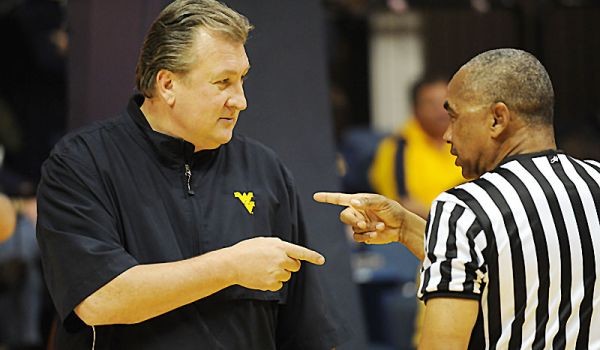One Burning Question: How Can West Virginia Replace Its Lost Talent?
Posted by Chris Stone on November 2nd, 2016The idea of building around a system or a specific style of play is not a new one in college basketball. Villanova’s Jay Wright, for example, has historically succeeded by playing a four-out, one-in offensive system that features guards who can shoot and take advantage of mismatches. The Big 12 also has its share of programs with a knack for finding players and fitting them into a largely predetermined system of play. Kansas head coach Bill Self has been notoriously stubborn about his high-low offense, even going so far as to suggest there is a target number of three-point field goals the Jayhawks look to take each season. At VCU, Shaka Smart earned his reputation by regularly recruiting players best suited to succeed in the system he dubbed “HAVOC.” Over the past several seasons, another Big 12 program has made waves by instituting a similarly successful, if not somewhat unorthodox, system.

With a revamped press philosophy, West Virginia is climbing its way back up the college basketball mountain. (USA TODAY Sports)
West Virginia has developed a fast-paced, in-your-face press — Press Virginia, if you will — that has turned the Mountaineers from a merely average defensive team into one of the very best in the country., Bob Huggins’ team has ranked among the top two nationally in defensive turnover percentage the last two seasons, causing a miscue on over a quarter of their opponents’ offensive possessions. All those giveaways in turn led to easy buckets and spurred West Virginia on to consecutive NCAA Tournament bids after several years of middling efforts. The question now is whether the proven system can withstand a significant shock to its personnel. West Virginia no longer has the services of either of their two double-figure scorers from a year ago — Jaysean Paige is out of eligibility and big man Devin Williams declared early for the 2016 NBA Draft. The pair provided the Mountaineers with something of an offensive safety net when the turnovers weren’t coming. Jonathan Holton is also finished. The 6’9″ forward –one of the signature pieces in Huggins’ pressing defense — was the type of versatile athlete who excelled atop the press. Holton could defend smaller players coming upcourt with time to quickly recover and battle with some of the league’s best in the post. He was also the team’s second-best rebounder, helping to close out defensive possessions after opponents had gotten through the pressure and taken a rushed shot.
West Virginia has some experience playing without Holton on the court, as the senior was suspended for four games in 2015-16. During that stretch, the Mountaineers picked up an away win at Iowa State and a home win over Baylor, but lost tough away games at Florida and Kansas. Senior Nathan Adrian filled in admirably in Holton’s absence, but despite carrying a similar physique, he has a tougher time defending opposing guards at the top of the press — borne out by his higher fouls per 40 minutes rate last season (6.9 versus Holton’s 4.6). Both sophomore Esa Ahmad and junior Elijah Macon will spend some time in Holton’s old spot as well, but Adrian figures to be the predominant point man if history is any guide. Huggins should also have a reliable collection of guards to rely on to run his defense. Upperclassmen Jevon Carter, Daxter Miles and Tarik Phillip will all be back, and while Phillip is probably the best offensive option of the trio, all three are disruptive defenders who create those incredibly valuable turnovers for the Mountaineers.
Still, the biggest question going into this season remains the viability of the system as a whole — can Press Virginia overcome the significant loss of those individual talents? West Virginia does not have a legitimate scoring option like Paige on its roster this season, and Adrian, Ahmad and Mason cannot replicate the skill set that Williams brought to the offense. The players who remain will need to figure out how to run a better half-court offense or create more turnovers and easy buckets because the safety net of the past couple of years isn’t in Morgantown anymore.









































